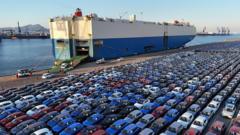Donald Trump reinforced his stance on impending tariffs for foreign vehicles, stating that he remains unconcerned about the potential for higher car prices passed onto consumers, asserting that it might bolster domestic manufacturing.
Trump Dismisses Concerns Over Rising Auto Prices Amid New Tariffs

Trump Dismisses Concerns Over Rising Auto Prices Amid New Tariffs
Former President's Comments Highlight Controversial Trade Policies and Potential Global Repercussions
Former President Donald Trump has made headlines again after declaring he "couldn't care less" about rising vehicle prices due to newly imposed tariffs of 25% on foreign-made cars and parts. He made these statements during an interview with NBC News, emphasizing that he believes the price increase would ultimately drive consumers toward American-made vehicles.
These tariffs are scheduled to take effect on April 2, with further fees on car parts starting in May. Analysts have sounded alarms about the possible negative impact on U.S. car production, with fears that some manufacturers may temporarily halt operations as they adapt to the new financial landscape.
In response to concerns regarding consumer prices, Trump maintained a defiant approach, inviting foreign carmakers to reconsider production locations: "If you make your car in the United States, you're going to make a lot of money." A recent CBS News poll revealed that 72% of American consumers fear that these tariffs will lead to increased costs, with a notable portion believing the administration is failing to adequately address economic affordability for everyday citizens.
Peter Navarro, a senior trade advisor to Trump, urged Americans to "trust in Trump," claiming that previous tariff measures, specifically against China, have resulted in economic prosperity and stability. However, labor union representative Shawn Fain acknowledged the importance of tariffs but criticized Trump for his broader policies affecting labor and trade.
Despite initial delays in implementing these tariffs following pressure from major car manufacturers like Ford and GM, Trump seems resolute in proceeding without further delays unless substantial concessions are offered by foreign nations.
In a separate initiative, Trump has threatened to impose additional tariffs on Russian oil if negotiations regarding the Ukraine conflict stall. He claims this move would come swiftly if he perceives a lack of cooperation from President Vladimir Putin, with the potential tariffs reaching up to 50%.
As the outlines of these tariffs emerge, tensions are escalating not just domestically but with international trade partners as well. The UK and other nations are preparing potential retaliatory measures, indicating a possible trade conflict. In a statement, Prime Minister Sir Keir Starmer has expressed a desire to avoid escalating into a full-fledged trade war, while Germany, France, and Canada have condemned Trump's actions as unjust provocations.





















